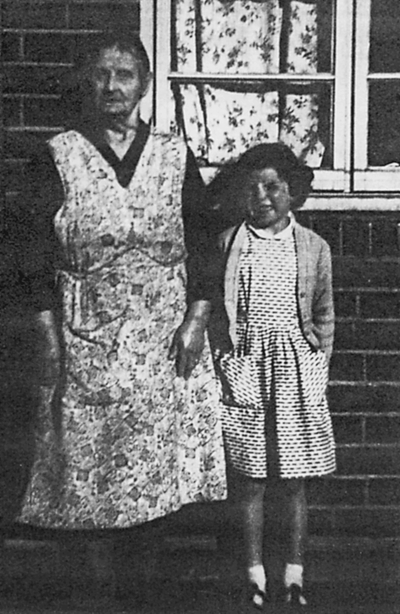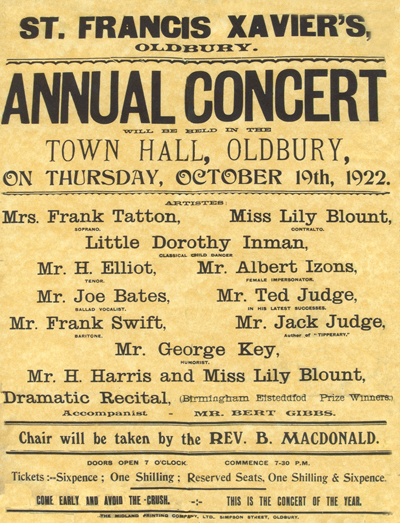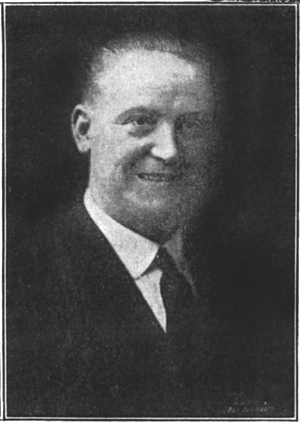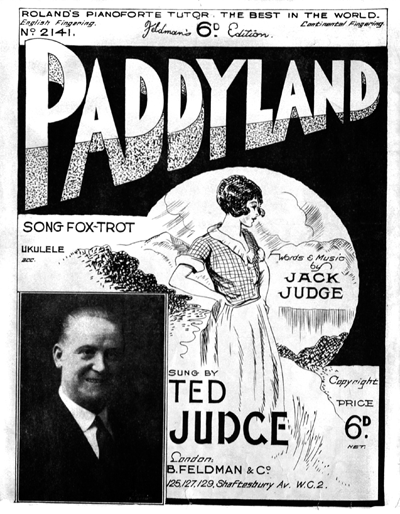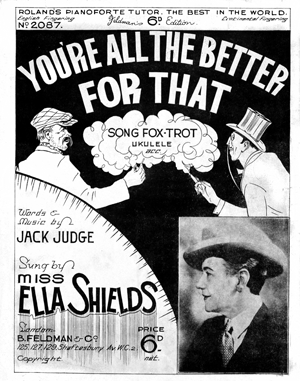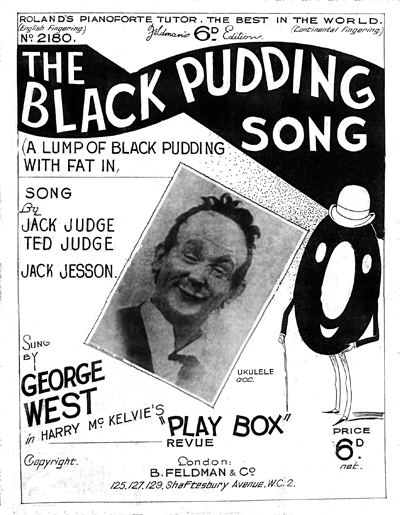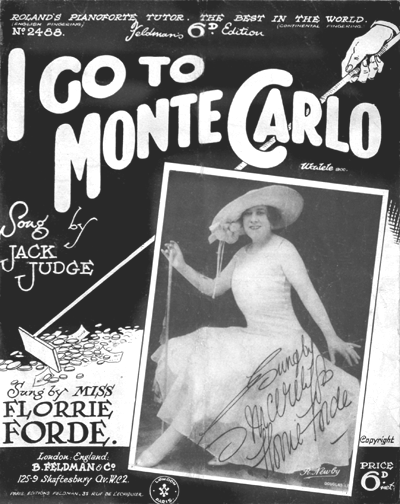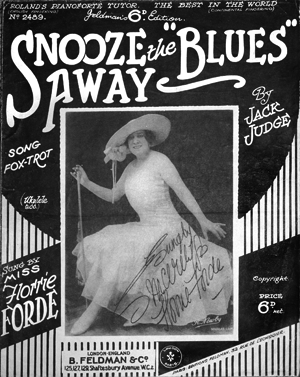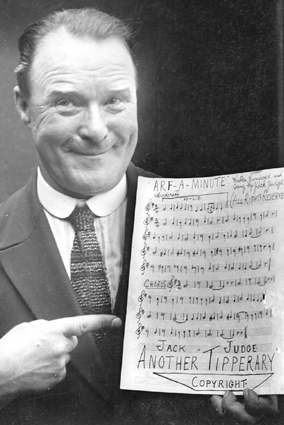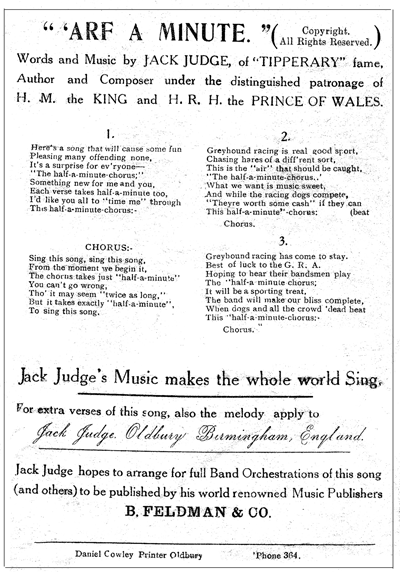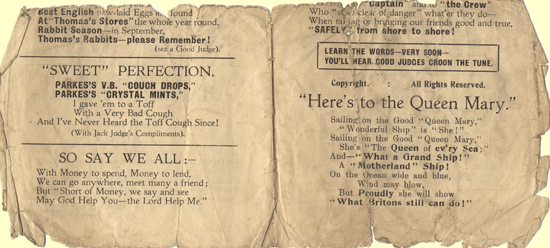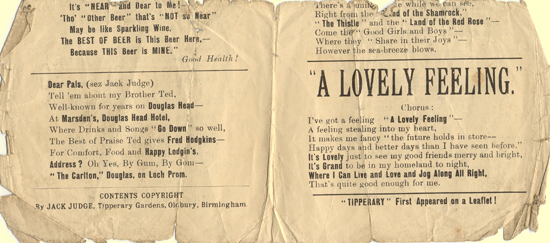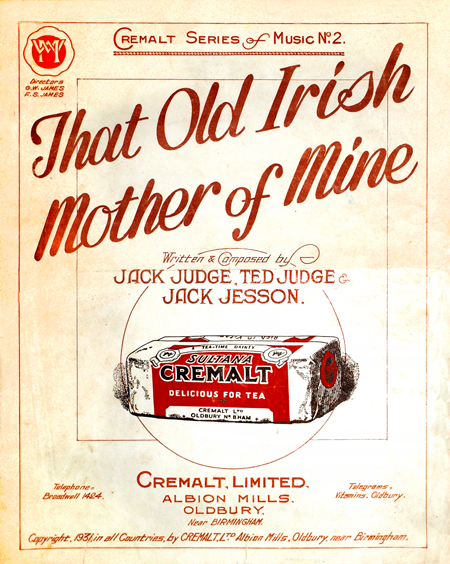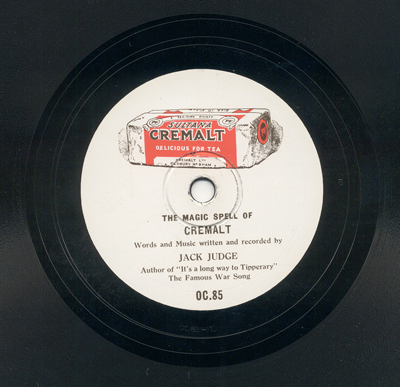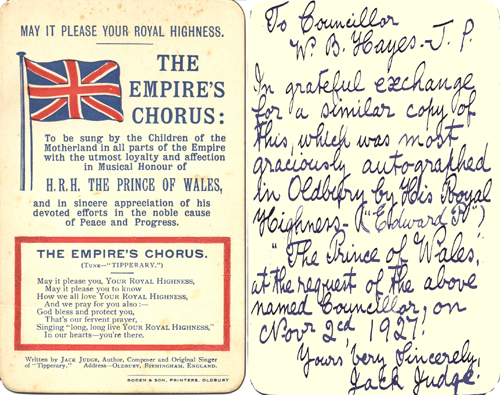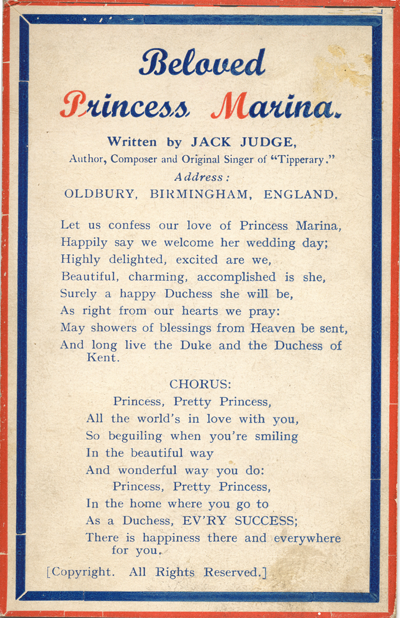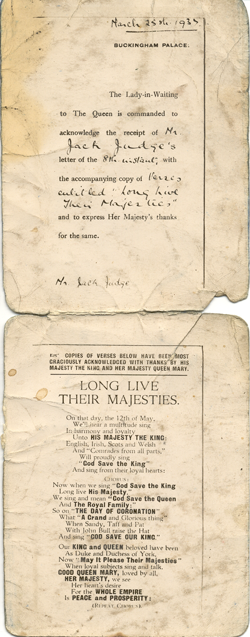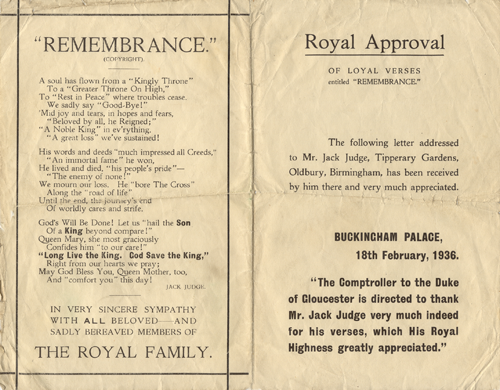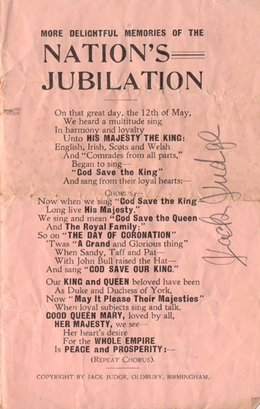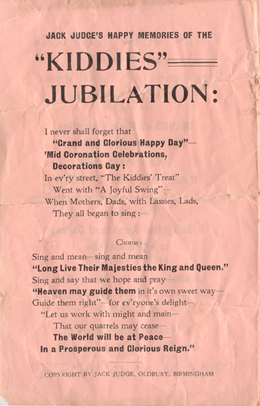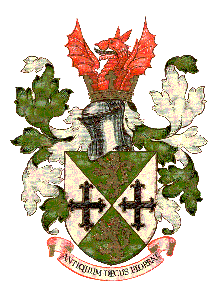
|
History
of Oldbury, Langley and Warley
|
||
|
Communities
of the West Midlands
|
||
|
The
website of Langley Local History Society - Oldbury Local History
Group - Old Warley Local History Society
|
||
 |
||
| HOME | |
| NEWS & EVENTS | |
| HISTORY SOCIETIES | |
| PUBLICATIONS | |
| GALLERY | |
| QUESTIONS | |
|
article 008 - Part 3 JACK JUDGE - HIS LIFE AND MUSIC
|
|
PART
THREE - LOSS AND HAPPINESS
|
|||||||||||||||||||||||||||||||||||||||||||||||||||||||||||||||||||||||||||||||||||||||||||||
|
Jack Judge 1872 - 1938
An end to touring Jack's career as a music hall performer came to a sudden halt in 1921, just ten years after it started. Jinny fell ill with tuberculosis in the spring of that year, and died in the September. This was a great blow to Jack, and he ceased touring the music halls of the country: henceforth, he would perform locally and return to his first rôle of wise-cracking fishmonger on Oldbury market. This was the start of a period of great sadness for Jack. His second son, Thomas, had also contracted tuberculosis, and he died the following January. Then, in February 1922, his mother, Mary, died.
There were two joyful events in Jack's life at this time to counteract the sadness. The first was the marriage of his daughter Jane Ann, 'Cissie', to Sidney Lane, and the birth of Jack's first grandson, John Patrick Lane, in 1922. 'Jack' Lane would be the only grandchild that Jack was to have. The second event was Jack's marriage to Maria, 'Ria', Oliver. Ria Oliver was a war widow, whose first husband, John Thomas Oliver, of the South Staffs Regiment, was killed at Givenchy in March 1915. She was left with young three children, Lily, John Thomas and Harvey, and was living in Canal Street, just across the canal from Low Town. When Jinny fell ill, she had become the laundress for the Judge family. Jack fell in love with her soon after Jinny's death. They were married in April 1922, and they had twin girls, Mary and Rita, in August. Another daughter, Kathleen, was born in 1923, completing Jack's new family.
There was one other loss to come. Cissie has developed a goitre during her pregnancy with John, and in 1924 this grew larger. It began to affect her breathing, and she died from heart failure. Some time later, Sidney Lane remarried and the Lane family had less contact with the Judges. Jimmy Judge, Jack's remaining son with Jinny, did not take easily to the new family, and he left home to join the army, starting a period of separation for the next decade, during which the family at Oldbury hardly knew where Jimmy was, or what he was doing. Jimmy finally returned home in 1933, discharged from the army with advanced tuberculosis. He did not inform the family of the reason for his return, and the next year he went away again, this time to Knightwick Sanatorium, where he died soon afterwards.
Music again
Understandably, Jack wrote little or nothing in this period of loss and sadness, although, occasionally, he performed locally, as this poster for a concert at St Francis Xavier Church confirms. Whatever his personal difficulties, he always rose above them to support local organisations and churches by performing for them.
The main person who continued to sing Jack's songs around the variety theatres was Ted Judge. Ted had established a separate career as a performer, and featured much of Jack's music in his act. He was particularly well regarded on the Isle of Man, featuring in their summer season every year from 1913 to 1953.
Jack and Ted started to work together on songs. As the 1920s progressed, Jack's voice became huskier, and Ted became the main exponent of his music. He is featured on the song-sheet as the singer of Jack's 1929 song 'Paddyland', about a young Patrick John Molloy, who has sailed away to America and dreams of his sweetheart back in Ireland.
Although Jack had left the professional stage and exiled himself to the Midlands, Bert Feldman continued to publish the best of his music. Most of his published songs were taken up by well-known variety artists: 'Tomorrow, perhaps, but not Today' (1928) was sung by Norah Delaney, and 'You're all the Better for That' (1929), by Ella Shields, both having words and music attributed to Jack alone.
In the late twenties, Jack and Ted were joined by another Midland musician, Jack Jesson, who led 'The Blue River Band', and this proved to be a productive partnership. Jack Jesson was able to arrange Jack's tunes, and several are attributed to 'Jack Judge, Ted Judge and Jack Jesson', including 'Shake 'em all away' and 'Will you be Sad Tomorrow?', both from 1930. Ted had written a comic song 'A lump of Black Pudding with Fat in', which was improved by the two Jacks and published jointly as 'The Black Pudding Song', and sung by George West.
As late as 1933, Florrie Forde, who had sung 'Tipperary' in 1912, again featured as the singer of two of Jack's songs on the sheet music. These were 'I go to Monte Carlo' and 'Snooze the Blues Away'. These were the last of Jack's songs to be published: although he did continue to write, he was unwell by 1933, and did not send any more of them to Bert Feldman.
One of the last songs he wrote was 'Arf a Minute', which celebrated greyhound racing, a subject dear to his heart, and he claimed in the song that the chorus took exactly thirty seconds to sing. He was photographed with the manuscript, which clearly reads 'Another Tipperary'.
Alas, it was not another 'Tipperary', and the song was never published, although he did issue a leaflet with words, and his "hopes for full band Orchestrations of this song (and others) to be published ..." . His other statement on the leaflet is more accurate, "Jack Judge's Music makes the whole world Sing", for his tunes are simple, but eminently singable, and ideal for their intended recipients, the music hall audience.
Advertisements and verses Jack had always written little verses and ditties. Like his songs, they are not great literature, but they do amuse, and started as a way of attracting people to his fish business. In the twenties, he collected verses about traders and events, and published them as printed sheets which sold for a penny at his stall and on the streets. Some of these survive, usually as odd torn and tattered copies:
Two typical verses on local traders are found on another leaflet under the heading:
The capitals, spelling and bold sections are just as Jack had them laid out!
One of Jack's songs that Bert Feldman did not publish was 'That Old Irish Mother of Mine' by Jack, Ted and Jack Jesson. It is a sentimental waltz about an old lady waiting at her cottage in Donegal for her child's return, and Bert Feldman probably considered it too sentimental and out of character for Jack. Nevertheless, it was published in 1931 by a flour mill at Rood End, Cremalt Ltd, Albion Mills, Oldbury. 'Cremalt' was a malt and flour mixture sold to bakers, ogether with the recipe and suitable baking tins that produced loaves with the word 'CREMALT' on the side. It was a nutritious loaf, very popular at a time when people were not well fed. Jack wrote several verses and songs about the product, and recorded some of them. It has been claimed that these were the first 'advertising jingles'. They had such commanding titles as 'The Cremalt Song' and 'I've been eating Cremalt'. The words seem to have changed each time they were recorded or performed, and no two versions are exactly the same. The tunes were quite catchy, and the children of the area went about singing them. Perhaps it was in gratitude for the excellent publicity that Cremalt published 'That Old Irish Mother of Mine'! Jack recorded another song, 'The Magic Spell of Cremalt', based on the spelling of Cremalt with a 'C' not a 'K', and this was backed by a 'Novelty Waltz and Foxtrot Song' which extols the virtues of "a laugh and a joke, a drink and a smoke".
Jack was supporter of West Bromwich Albion, and they too were beneficiaries of his verses. In 1931 they reached the final of the FA Cup from the second division, and played Birmingham City from the first division at Wembley. Jack wrote 'Down Old Wembley Way', by way of encouragement. It was a 'local derby', and Albion, despite being the underdogs, won 2 - 1. They were less successful against Sheffield Wednesday four years later, when they lost 4 - 2, but again Jack celebrated with a number of verses on a pamphlet, including,
Royalty All his life, Jack was a great admirer and supporter of the Royal Family. He wrote verses for various royal occasions, reflecting the nation's joys and sorrows. He sent them to Buckingham Palace, and was delighted when he got a reply. The verses and the acknowledgement letters would find their way into his pamphlets. One of the earliest was 'The Empire Chorus', set to the tune of 'Tipperary', which saluted Edward, Prince of Wales. When the Prince opened the new Birmingham to Wolverhampton Road in 1927, Cllr W Hayes gave a copy to the Prince on Jack's behalf: Jack wrote a note of thanks to Cllr Hayes on the back of a another copy .
In 1935 the Silver Jubilee of King George V and Queen Mary was held, and Jack sent them 'Long Live Their Majesties', an exuberant verse praising them.
On the occasion of the King's death the next year, the verse 'Remembrance' had a very different tone. The pamphlet describes it as being "in very sincere sympathy with all beloved and sadly bereaved members of the Royal Family". Jack published this together with the letter received by him, "The Comptroller to the Duke of Gloucester is directed to thank Mr. Jack Judge very much indeed for his verses, which His Royal Highness greatly appreciated."
Two years later, King George VI, would, in turn, pay his respectson the occasion of Jack's death by sending a telegram to Jack's family. However, before that, Jack was to celebrate one one more event, the Coronation of King George VI and Queen Elizabeth. He produced a pamphlet of four pages, including 'More Delightful Memories of the Nation's Jubilation'. and 'Jack Judge's Happy Memories of the "Kiddies" Jubilation'.
Jack was not shy of self-publicity, and this leaflet also includes a four-line verse which neatly summarises his vies of his writing:
Sources The information in this article has been taken from 'Jack Judge, the Tipperary Man' by Verna Hale Gibbons, from articles by Leslie Frost in the Oldbury Weekly News in 1962, from contemporary newspaper articles, from Gillian Nicklin (Jack's only great-granddaughter), from research and family papers of the Stanley family (descendants of Jack's sister, Jane Ann), and from personal research. Dates of births, marriages and deaths have been taken from these sources and the birth, marriage and death indices available online at freebmd.rootsweb.com, and from the on-line databases of ancestry.co.uk and familysearch.org.
Text and family tree in this format: © Dr Terry Daniels, 2011 Pictures and illustrations: © Various, as stated in captions Contact for permission to reproduce
If you have objects, photographs, records or other items associated with Jack Judge, please contact this website, since the local history societies of Oldbury are building up as complete an archive on Jack Judge as possible, and would like to add copies of anyitems to it. We are particularly interested in copyinging recordings of Jack's music.
|
